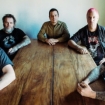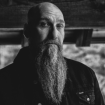"There's so much heavy music out there, but I don't feel it," Neurosis vocalist-guitarist Steve Von Till says. "That's why we started asking ourselves, 'What really is emotionally heavy?'"
For nearly three decades, Neurosis have posed that question, and in answering it, they've embodied heaviness—both in terms of their tribal, sludgy post-metal, and in the crushing lyrics Von Till and his fellow vocalist-guitarist Scott Kelly growl about death, pain, and all things epic. That has not changed with their latest album, Honor Found in Decay. Whether on the slow, sweeping groove and violin-like samples of "Casting of the Ages" or the way the guitars drop out in "At the Well" only to come back with pounding drums to support Kelly's haunting repeated lyric, "In a shadow world," the album is heavier in more ways than just its riffs. "We really don't know musically what we're doing," Von Till says humbly. "We just try to find the sounds that resonate."
Prior to the album's release, we caught up with Von Till and Kelly to find out just how they continue to succeed in doing that.
AFTER YOU FINISHED TOURING FOR YOUR LAST ALBUM, 2007'S GIVEN TO THE RISING, AT WHAT POINT DID NEUROSIS RECONVENE AND BEGIN WORKING ON A NEW ALBUM?
SCOTT KELLY It just came slowly, as these things do. We don't support ourselves off the band, so we're not under the gun to pop something out every year.
STEVE VON TILL We don't ever make a conscious point of saying or realizing, "Now we're writing a new album." It's actually chaos. Things kind of take shape on their own at their own will. Some of the seeds go all the way back to Given to the Rising. There's no method to our madness.
SO HOW DO YOU KNOW WHEN A RECORD IS DONE?
KELLY You just know.
NEUROSIS FORMED IN 1985. HOW ARE YOU ABLE TO STAY ON THE SAME PAGE WITH THE OTHER BAND MEMBERS, YEAR AFTER YEAR?
VON TILL It sounds trite when I say it, but early on, even when we had a way more primitive punk-rock expression of what we wanted to do, we sensed there was something greater and deeper in what we were doing.
If you look at why most bands dissolve or separate, it's for stupid reasons: "Personal differences" or "musical differences" or "ego trips" or all this other shit. We're able to put all that shit aside and really just love making this music. It's our way of making sense of the world, our way of dealing with life.
WHY DID YOU EXPAND YOUR SOUND FROM PUNK ORIGINALLY?
VON TILL Basically we realized that the emotions we wanted to express required some kind of deeper, all-encompassing, complete sensory overload type of music. Everybody's life has its ups and downs, and its intense emotional things.
WHAT ARE SOME OF THE INTENSE EMOTIONAL THINGS YOU'VE LIVED THROUGH IN NEUROSIS?
VON TILL Being in Oakland in the earthquake of '89 and our rehearsal studio was right near the Bay Bridge at the time, where it was collapsed and people were still trapped a day later in a concrete tomb. There's so many. Being in Northern Ireland in the early '90s during the most extreme amount of violence that they'd had in a decade. We had British soldiers pointing guns at our kneecaps as we were loading our gear into the club, because they don't know what's going on. Having some fucking gangster scumbag pulling a gun on whoever was driving the van in Detroit. All of that. It's life. It's humanity. It's beautiful and it's ugly and there's no shortage of inspiration on any day. [Laughs]
WHEN YOU HAD THE MILITARY POINTING GUNS AT YOU, HOW DID YOU REACT?
VON TILL Very carefully. [Laughs] No sudden moves.
STEVE, YOU'RE A SCHOOL TEACHER. IS IT WEIRD TRANSITIONING BACK TO THE CLASSROOM AFTER THINGS LIKE THAT?
VON TILL Absolutely not. I think it brings with it a great appreciation for where each person might be coming from. You think, OK, here's a bunch of kids in a classroom and everything's nice and neat and tidy and you're just teaching reading and math, but you don't know what each of those kids' experiences are. You don't know why they're having a difficult time. I think it just lends itself to helping people see that the world is vast and also just having some compassion for anyone.
SCOTT, YOUR FATHER PASSED AWAY IN JANUARY. DID YOU PAY TRIBUTE TO HIM ON THE ALBUM?
KELLY Well, ironically, he passed away a year ago today. I wrote a song about him on the album, "The Casting of Ages." It's just about him and the experience of watching him die. He got really sick really fast. He had full-blown leukemia. He was a pretty strong guy, even at 77. He was still going to the gym three times a week and still bench-pressing 150 pounds. He was in good shape. And it just destroyed him fast. And me and my mom were there, and he just passed. You just can't really undo that sort of moment. I'm still kind of stuck there in a lot of ways. That song helped.
He actually asked me to write a song about him, which was pretty funny, because it really wasn't his style. He never really understood or was that into what I did as far as music went. Then, in January 2011, he came and saw us play in San Francisco, and I think it really changed his mind. He had never seen us play and I think he respected it a lot and he was surprised on all levels. So that was really cool. It was really good to have that kind of acknowledgement from him. There is a Neurosis poster in my parents' house now. It's pretty cool.
YOU SAID HE DIDN'T UNDERSTAND YOUR MUSIC, BUT WAS HE SUPPORTIVE OF NEUROSIS PRIOR TO THAT SHOW?
KELLY Not really. No. He thought it was pretty stupid. But he didn't really know anything about it. He didn't want to know anything about it. He made that choice to go to the show and brought my mom, and it turned out that pretty much my whole family was there except for our two littlest kids. So it made for a special night, especially considering what happened with him passing away, because he was definitely the strength of the family.
IT'S GREAT THAT YOU HAVE AN OUTLET WHERE YOU CAN PAY TRIBUTE TO HIM.
KELLY Yeah, I'm very lucky in that way. I have something to help let shit go from. I think I'm looking forward to playing that song live. I'm not sure. It might be too much. But I think it would be pretty incredible when we get to it.
TO END THINGS ON A LIGHTER NOTE, SCOTT, IS IT TRUE YOU HAVE AN AVERSION TO THE NUMBER 2?
KELLY [Laughs] Yeah. You never want to be No. 2. That has to do more with little kid stuff, like, "Are you going No. 1 or are you going No. 2?" You don't want to be No. 2. It would always blow me away when athletes would choose the number 2, because I figure they must have had a pretty fucked-up childhood to have missed that whole situation. Especially when number 3 is sitting right there and that's obviously a fantastic number and always has been.
DO YOU ALWAYS SKIP NUMBER 2 WHEN YOU NUMBER THINGS?
KELLY Unless it's followed directly by a 3, yeah. But 23? I like 23. That's a great number. But nobody wants to be No. 2.
In the special episode of Revolver's "No Distortion" series, below, watch Neurosis singer-guitarist Scott Kelly perform a solo unplugged rendition of "Stones From the Sky," a classic cut off his band's 2001 album A Sun That Never Sets, at Oregon's Crater Lake.












